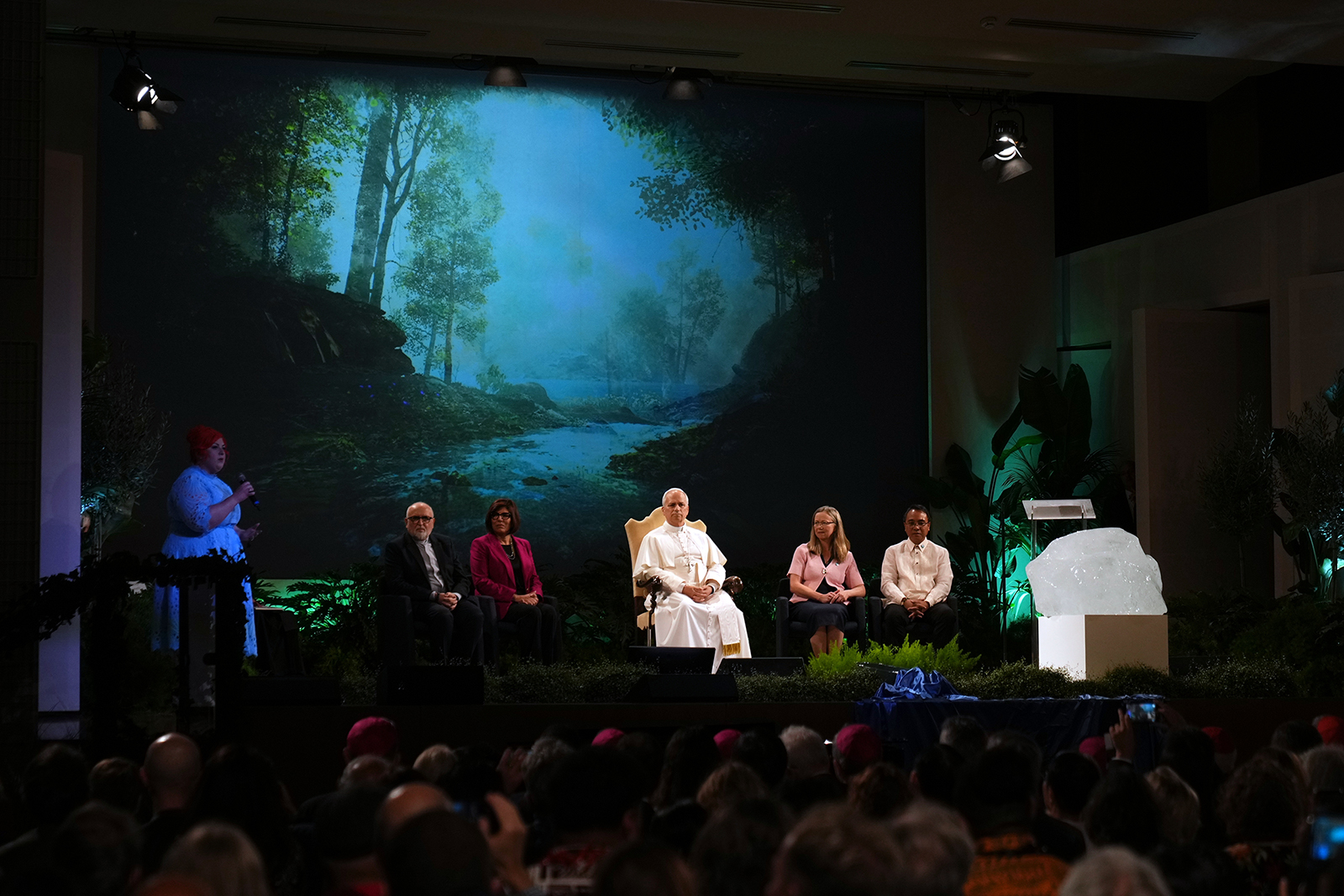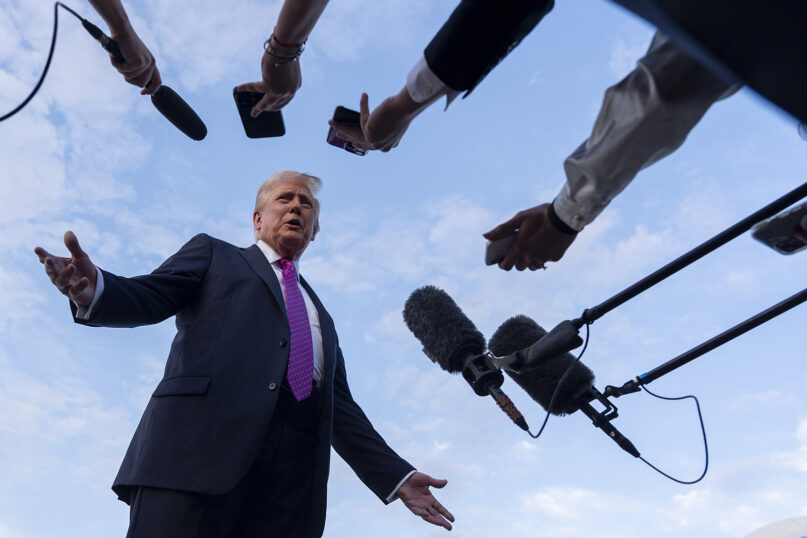
(RNS) — Those who hoped that Pope Leo XIV would back away from Pope Francis’ concerns about global warming and the environment were severely disappointed last week. Instead, Leo firmly embraced the environmental agenda Francis laid out in “Laudato Si’,” his historic encyclical that put the church firmly on the side of protecting the planet.
Pope Leo did this at Castel Gandolfo in an address Wednesday (Oct. 1) to over 1,000 participants in the Raising Hope Conference on the 10th anniversary of “Laudato Si’.” At the conference, religious leaders, scientists and activists prayed and discussed the role of religion in climate justice.
While a change of administrations in Washington has led the government to abandon efforts to deal with global warming, a change of papacies has shown the church will stay the course in defending God’s creation from wanton destruction.
In his Sept. 23 harangue to the United Nations, President Donald Trump said that in his opinion, global warming is “the greatest con job ever perpetrated on the world.” He urged nations to embrace oil and gas production.
Responding to Trump without naming him, Leo complained Wednesday that “Some have chosen to deride the increasingly evident signs of climate change, to ridicule those who speak of global warming and even to blame the poor for the very thing that affects them the most.”
Unlike Trump, Leo acknowledges the reality of climate change and reaffirmed the church’s commitment to protect God’s creation. Those concerned about global warming will be relieved that Leo is not changing course but is fully committed to protecting the environment.

President Donald Trump speaks with reporters before he departs on Air Force One at Morristown Airport, Sunday, Sept. 14, 2025, in Morristown, N.J. (AP Photo/Alex Brandon)
In his address, Leo celebrates the impact the encyclical has had over the last decade.
He rejoices that “This Encyclical has greatly inspired the Catholic Church and many people of goodwill.” He sees it as a source of dialogue and a resource for “reflection groups, academic programs in schools and universities, and partnerships and projects of various kinds on every continent.”
Leo is delighted that “Many dioceses and religious institutes have been moved to take action to care for our common home, helping once more to give priority to the poor and marginalized in the process.” He notes that the encyclical has had an impact on “international summits, ecumenical and interreligious dialogue, economic and business circles, as well as theological and bioethical studies.”
“Care for our common home,” a phase made popular by Pope Francis, is now common in academic, scientific and political presentations.
Francis’ “concerns and recommendations have been appreciated and accepted not only by Catholics,” explains Leo, “but also many people outside the Church who feel understood, represented and supported during this specific moment in our history.”
Leo thanks God for “this gift we have inherited from Pope Francis!”
But Leo is not content to just celebrate past achievements. “The challenges identified in Laudato Si’ are in fact even more relevant today than they were ten years ago,” he says.
“What must be done now,” he asks, “to ensure that caring for our common home and listening to the cry of the earth and the poor do not appear as mere passing trends or, worse still, that they be seen and felt as divisive issues?”
Leo calls for a conversion of heart that goes beyond intellectual conviction and will include “an ecological conversion that transforms both personal and communal lifestyles.”
For Leo, this is not some hippie add-on to Christianity. “For believers,” says Leo, “this conversion is in fact no different to the one that orients us toward the living God. We cannot love God, whom we cannot see, while despising his creatures. Nor can we call ourselves disciples of Jesus Christ without participating in his outlook on creation and his care for all that is fragile and wounded.”

Pope Leo XIV attends the inauguration of the Laudato Si’ High Training Center in Castel Gandolfo, Italy, Sept. 5, 2025. (AP Photo/Andrew Medichini)
Like Francis, Leo points to St. Francis of Assisi, who “lived in simplicity and in wonderful harmony with God, with others, with nature and with himself. He shows us just how inseparable the bond is between concern for nature, justice for the poor, commitment to society, and interior peace.”
Leo urges us to “grow in these four relationships — with God, with others, with nature and with ourselves — through a constant attitude of conversion. Integral ecology thrives on all these relationships.”
“We inhabit the same planet, and we must care for it together,” insists Leo. “I therefore renew my strong appeal for unity around integral ecology and for peace!”
Individual action alone cannot solve the climate crisis. Again quoting Pope Francis, Leo affirms that “the most effective solutions will not come from individual efforts alone, but above all from major political decisions on the national and international levels.”
He calls on everyone in society, through nongovernmental organizations and advocacy groups, to “put pressure on governments to develop and implement more rigorous regulations, procedures and controls.”
This is the opposite of what the Trump administration is doing as it eliminates environmental regulations.
Leo urges citizens to be active in political decision-making at national, regional and local levels. “Only then will it be possible to mitigate the damage done to the environment.”
Leo hopes that the upcoming U.N. Climate Change Conference, known as COP30, “will listen to the cry of the Earth and the cry of the poor, families, indigenous peoples, involuntary migrants and believers throughout the world.”
Everyone must work together at finding solutions for today’s challenges, says Leo, “always striving tenaciously for the common good. There is no room for indifference or resignation.”
“God will ask us if we have cultivated and cared for the world that he created (cf. Gen 2:15), for the benefit of all and for future generations and if we have taken care of our brothers and sisters (cf. Gen 4:9; Jn 13:34),” warns Leo. “What will be our answer?”
